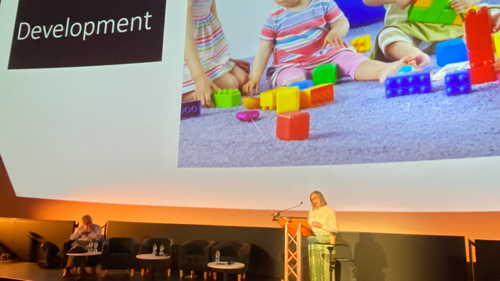Jenny highlighted three key areas of impact on "The Lockdown Generation": Development, Education and Mental Health.
In respect of Development, she noted that there had been many reports of young children going back to school who couldn't remember how to tie their shoelaces or eat with a knife and fork. Children were not used to mixing with other children, to sharing, to taking turns and playing together, and increased numbers demonstrated separation anxiety. The anecdotal evidence was backed up by research commissioned by The Education Endowment Foundation, which found that the proportion of Reception children reaching the expected levels of development in all areas (communication and language; physical development; literacy; maths; and personal, social and emotional development) was 59% in 2021, compared to 72% for the 2019 cohort. This difference is equivalent to, on average, three more children in every classroom not reaching the expected levels by the end of the school year.
On Education, a study by UCL and the Sutton Trust reveals disadvantaged pupils have suffered greater learning loss during the pandemic. Covid had "severely widened existing inequalities" with schools in disadvantaged areas having slower access to online learning during lockdown and pupils from poorer households lacking access to suitable devices and quiet spaces. The results of year 6 SATs this year showed a national decline, but detailed figures published by the Department for Education found disadvantaged children had a steeper fall than their better-off peers. Covid has potentially reversed a decade of progress in closing the attainment gap. The evidence is clear that disadvantaged students have fallen further behind during the pandemic and we know that these students will also face the biggest challenges in educational recovery.
With regards to Mental Health, Jenny set out a concerning picture. Teachers have frequently reported concerns around the impact on children's wellbeing and this is sadly supported by the data. In England, between April and September 2021, there was an 81% increase in referrals for children and young people's mental health services compared with the same period in 2019. The increase for adults (19 years and over) in the same period was 11%. The situation regarding eating disorders is especially stark. The number of new referrals for eating disorders of children and young people aged 0 to 18 in England from July to September 2021 was up 115% on the same time-period in 2019.
Jenny went out to set out the Lib Dem policies which can help our children to recover:
- Ensuring the full £15 billion of catch-up funding recommended by the Government's former Education Recovery Commissioner, Sir Kevan Collins, is invested and targeting additional funding to disadvantaged children and those with special educational needs;
- Placing wellbeing at the heart of every school;
- Extending free school meals to all primary school children and to secondary school children whose families receive Universal Credit; and
- Ensuring that no child with mental health issues is turned away without support, by expanding access to mental health services to account for greater need and ensuring targeted action to address the backlogs in children's health services.
She concluded by noting that there is no universal experience of coronavirus, "The pandemic has impacted different children and their families in different ways. As is often said, we are all in the same storm but we are in different boats. But there is no doubt that we must be relentless in ensuring that our children and young people are prioritised in every decision we make. They are our future."
You can find a full video of Jenny's speech here: https://youtu.be/RnRgU2QxdvU



